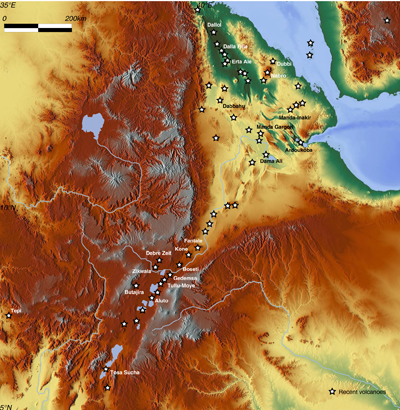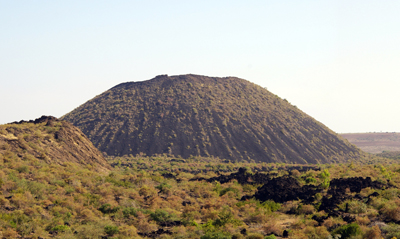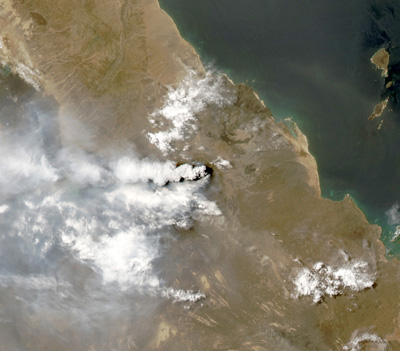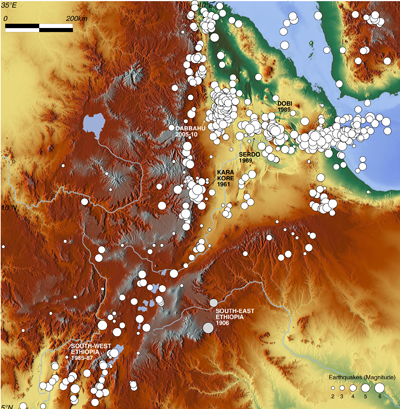Volcanism
and seismicity
Volcanic and seismic activity are the most
evident expressions of the deformation processes acting at lithospheric
plate boundaries; they give rise to the most important geological
risks related to the active processes shaping the surface of
our planet. Being an area of active deformation, the rift valley
is characterized by numerous volcanic edifices, most of which
are still active or showing evidences of very recent activity,
and by widespread seismicity.
Volcanic activity
About 50 volcanic edifices in Ethiopia have documented activity
during the Holocene. The majority of recent volcanoes are located
within the Afar depression; among the active volcanoes, the
Erta Ale is surely the most famous, being characterized by a
basaltic lava lake on its summit caldera that has been active
more or less continuously in the last 120 years. On the same
volcanic alignment, the DallaFilla volcano gave rise -during
2008- to the biggest eruption ever recorded in Ethiopian territory
in historical times. Characterized by current activity is the
Dabbahu volcano whose activity started during September 2005
with a dyke emplacement, a strong seismic swarm and a small
eruption, followed by other 14 dyke intrusions and 4 small eruptions,
the last of which occurred during May 2010. In June 2011, a
major eruption occurred at Nabro volcano, at Eritrea-Ethiopia
border; many other volcanoes (e.g., Dallol, Ardoukôba,
Manda-Inakir, Alayta, Dubbi) have documented activity during
the XIXth and XXth centuries.
To the South of the Afar depression, many volcanic edifices
have documented historical activity: an example is the Fantale
volcano, in the northern part of the Ethiopian rift valley,
which produced basaltic lavas at the beginning of the XIXth
century. Analogously, basaltic lava flows have been erupted
in the first half of the XIXth century from small volcanic centers
close to the Kone caldera. More to the South, obsidian flows
from the flanks of the Aluto volcano have been at around 2000
years b.p.; this volcano (like many others in the region) is
characterized by strong fumarolic activity and analysis of satellite
imagery has evidenced episodes of deformation (such as rapid
uplift up to 10-15cm during 2004 and 2008) that indicate a significant
activity of the magmatic system.

Recent volcanoes in Ethiopia
(click to enlarge)

Small cone in the northern
Ethiopian Rift Valley (click to enlarge)

The June 2011 Nabro eruption
(Nasa image) (click to enlarge)
Seismic activity
The whole Ethiopia rift valley is characterized by a diffuse
seismic activity, typically represented by events with magnitude
around 5-5.5; analysis of the seismic activity in the last 150
years has evidenced that earthquakes with larger magnitude are
less frequent although they have occurred in the past.
The majority of seismic activity is localized within or around
the Afar depression: this region is characterized by events
that have reached or have exceeded magnitude 6. Generally the
strong earthquakes are associated to seismic swarms that may
last for months, as in the case of the Kara Kore seismic crisis
that produced -on the western escarpment of the depression between
May and September 1961- more than 3500 quakes with magnitude
equal or higher than 3.5 and an estimated maximum magnitude
of 6.5. Other strong seismic sequence is the one that occurred
during March-May 1969 in central Afar, where about 250 events
with magnitude equal or higher than 3.0, at least 12 with magnitude
higher than 5, and 4 with magnitude around 6 destroyed the small
town of Serdo. A strong seismic sequence also occurred during
August 1989 in the Dobi area: in this case, a first earthquake
with magnitude 6.2 was followed in the successive 40 hours by
14 events with magnitude higher than 5, two of which that reached
magnitude 6.1 and 6.3. In Afar, the seismic activity is often
localized close to major volcanoes and associated to eruptions,
as shown by the sequence (with events characterized by magnitude
up to 5.5) that in 2005 accompanied the Dabbahu eruption.

Earthquakes
in Ethiopia (click to enlarge)

